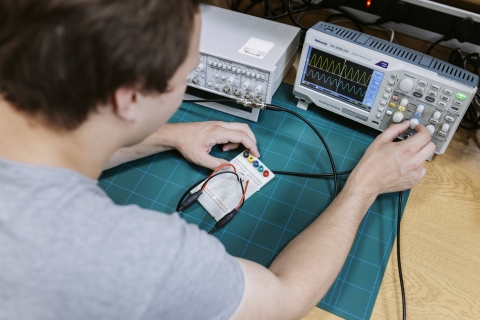
Key information
UCAS code:
H630
Typical offer:
112-120 points from 2 or 3 A levels, or equivalent, to include a relevant subject
Showing content for section Overview
Overview
Design and operate the secure and sustainable power grids needed by advanced industrial nations with this future-focused degree.
You’ll bring together your interests in science and technology, developing expertise in contemporary electrical infrastructure, and put your skills and knowledge to work in hands-on projects shaped by current research. By studying innovations in areas such as electric vehicle charging, smart grids and energy storage, you’ll prepare yourself for power engineering careers that can make a positive impact on global society.
With increasing global demand for power engineers, and a growing recognition of the strategic importance of the sector, you’ll graduate with a compelling skillset for future employers.
Course highlights
- Play a part in mitigating climate change, promoting a greener planet, and fostering economic growth
- Enter a strategically valuable sector with the skills the industry is seeking
- Use industry-standard software and equipment in our Renewable Energy and Electrical Power Lab, Electronics Lab and Computer Lab
- Take on a power engineering placement, follow career-related modules, and explore energy installations on course field trips
Top 30
for student satisfaction
(Times Higher Education, 2024)
Contact information
Contact AdmissionsEntry requirements
BEng (Hons) Electrical Power Engineering degree entry requirements
Typical offers
- 112-120 points from 2 or 3 A levels, or equivalent, to include a relevant subject
English language requirements
- English language proficiency at a minimum of IELTS band 6.0 with no component score below 5.5.
We also accept other standard English tests and qualifications, as long as they meet the minimum requirements of your course.
If you don't meet the English language requirements yet, you can achieve the level you need by successfully completing a pre-sessional English programme before you start your course.
We look at more than just your grades
While we consider your grades when making an offer, we also carefully look at your circumstances and other factors to assess your potential. These include whether you live and work in the region and your personal and family circumstances which we assess using established data.
Facilities and specialist software

Power Electronics Laboratory
Get hands-on with the physical impact of electrical loads in a household or a city, and experiment with how electricity can be distributed using power grids. Compliment your learning as you conduct experiments with transformers and motors to simulations of the smart grid and wind turbines.

Renewable Energy Lab
Explore the generation and storage of sustainable power by practicing demonstrations with ground mounted solar panels, tesla batteries, a hydrogen fuel car and solid oxide fuel cells. You'll be able to develop technology to reduce human contributions to climate change.

Analogue and Digital Electronics Laboratory
Prototype and build circuit designs using a variety of components; from simple 'breadboard' circuits to complex devices. Test your designs in a safe environment, parallel to the testing systems used in the industry.
Careers and opportunities
With a degree in Electrical Power Engineering, you’ll have demonstrable skills and experience to secure roles in power generation, distribution or analysis.
The UK is seeking almost 200,000 roles in energy and utilities over the next decade, looking for “practical, hands-on, technical problem solvers who have the desire and initiative to manage, to lead and develop a career in engineering”.
You’ll be ready to fill those roles, by being on top of current thinking in the sector, with experience of systems, software and tools used by professional power engineers. You’ll also be well placed to develop your learning, whether through professional qualifications or deeper academic study.
Some potential job roles include:
- Power Systems Engineer: Specialising in the design, analysis, and optimisation of electrical power systems, ensuring reliable and efficient energy distribution.
- Renewable Energy Engineer: Focusing on developing and implementing sustainable energy solutions, such as solar, wind, and hydroelectric power systems.
- Control Systems Engineer: Designing and maintaining control systems for various applications, including power plants, manufacturing processes, and automation systems.
- Electric Vehicle (EV) Engineer: Working on the development of electric vehicles, including battery technology, charging infrastructure, and electric drivetrains.
- Power Electronics Engineer: Designing electronic systems and devices for efficient energy conversion and control, often used in renewable energy systems and electric vehicles.
- Energy Manager: Overseeing energy usage in organisations, implementing energy-saving initiatives, and ensuring compliance with energy regulations.
- Research Scientist: Conducting research in academic or industrial settings to advance the field of electrical engineering, contributing to new technologies and innovations.
How you'll spend your time
One of the main differences between school or college and university is how much control you have over your learning.
We use a blended learning approach to teaching, which means you’ll take part in both face-to-face and online activities during your studies. As well as attending your timetabled classes you'll study independently in your free time, supported by staff and our virtual learning environment, Moodle.
Term dates
The academic year runs from September to June. There are breaks at Christmas and Easter.
Modules
What you'll study
Core modules
All modules in this year are core.
Beginning with the concept of energy in different contexts, the module covers the main components associated with its production, conversion, delivery, storage and use. Lectures will also explore how energy systems can help create a sustainable future. Additionally, we'll discuss three-phase AC circuits due to their important role in electrical energy systems.
Through project-based and practical, hands-on learning, you'll learn about the practical aspects of printed circuit board design, manufacture, assembly and testing.
You'll learn about the software development life cycle and the tools used to build software programs, getting to grips with how to identify system requirements and convert a written specification to a procedural software design and quality metrics.
You'll also learn how to analyse a problem and formulate an algorithm for solving it.
In this module, you'll learn mathematical techniques that you can use for intricate engineering problems.
Over a full year, you'll work through topics including algebra, calculus, matrices and complex numbers, learning to recognise when an engineering problem calls for a given method.
You'll also learn efficient strategies for breaking down and solving multifaceted problems, applicable in both mathematical and engineering activity.
You'll start by grasping the essential theory behind combinational and sequential logic, Boolean algebra, and other core concepts.
Then you'll directly apply this knowledge as you analyse, design and implement digital circuits and systems using microcontrollers.
Through hands-on practical sessions and projects, you'll reinforce your learning, while developing crucial real-world engineering skills.
By the end, you'll be able to confidently identify key digital components, understand microcontroller architecture, and describe assembly language commands - ready for advanced study and career opportunities across electronics and computer engineering.
Core modules
All modules in this year are core.
In this team-based module, you'll work through the full product design process, considering economic, social and sustainability aspects at each stage.
You'll learn how to adopt an inclusive approach, make group decisions, and report on your processes. You'll also identify and take up professional development opportunities to get yourself career-ready.
Transformer parameters will be studied in order to conduct performance and efficiency calculations. You'll also be introduced to the basics of three-phase transformers.
You'll explore the measurements of different physical quantities, such as temperature, liquid level and flow rates.
You'll also investigate the various sensors for the measurement of physical quantities, and analyse the characteristics of instruments and the uncertainty of measurements.
You'll work in the lab and attend lectures to learn all about the construction and characteristics of different types of electrical machines, and single and three phase power transformers.
You'll formulate a smart business plan in this career-driven module, covering viability, licensing, funding, launch, and growth.
Working in groups, you'll use risk management principles to protect your plans, identify ethical issues and relevant regulations, and develop your ability to sell your vision to investors.
Core modules
With guidance from an expert supervisor, you'll identify a challenge that excites you and develop an approach to investigating it.
As you apply your analytical and creative skills to the project, you'll build self-confidence and resourcefulness alongside your new engineering capabilities.
You'll also learn to showcase your work professionally through reports and presentations that demonstrate your readiness for an engineering career after university.
This modules also explores the modelling of distribution networks and the topologies used, alongside the fundamentals of substations and their operation. The impact to distribution loads from the integration of renewables and EVs will also be explored.
The module also includes a number of seminars given by industrialists on topics of relevance to modern power systems and their operation.
Linear and switching power control circuitry will be considered for AC-AC, AC-DC, DC-AC and DC-DC control. The theory developed in lectures will be reinforced through tutorial sessions. The ability to analyse circuits and design systems will be supported through practical and simulation sessions.
Optional modules
You'll determine system requirements and design relevant controllers in this module, using industry-standard computer aided engineering packages.
You'll also explore the relative stability of systems, apply function identification to live data, and analyse the effects of changing parameters in a control system.
Furthermore, potentials and limitations of the technologies are considered.
On this course, you can do an optional study abroad or work placement year between your 2nd and 3rd years, or after your 3rd year, to get valuable experience working in industry.
We’ll help you secure a work placement that fits your situation and ambitions. You’ll get mentoring and support throughout the year.
Changes to course content
We use the best and most current research and professional practice alongside feedback from our students to make sure course content is relevant to your future career or further studies.
Therefore, some course content may change over time to reflect changes in the discipline or industry. If a module doesn't run, we'll let you know as soon as possible and help you choose an alternative module.
Supporting you
The amount of timetabled teaching you'll get on your degree might be less than what you're used to at school or college, but you'll also get support via video, phone and face-to-face from teaching and support staff to enhance your learning experience and help you succeed. You can build your personalised network of support from the following people and services:
Types of support
Your personal tutor helps you make the transition to independent study and gives you academic and personal support throughout your time at university.
As well as regular scheduled meetings with your personal tutor, they're also available at set times during the week if you want to chat with them about anything that can't wait until your next meeting.
You'll have help from a team of faculty learning support tutors. They can help you improve and develop your academic skills and support you in any area of your study in one-on-one and group sessions.
They can help you:
- master the mathematics skills you need to excel on your course
- understand engineering principles and how to apply them in any engineering discipline
- solve computing problems relevant to your course
- develop your knowledge of computer programming concepts and methods relevant to your course
- understand and use assignment feedback
All our labs and practical spaces are staffed by qualified laboratory support staff. They’ll support you in scheduled lab sessions and can give you one-to-one help when you do practical research projects.
During term time, Faculty Academic Skills Tutors (AST) are available for bookable 1-to-1 sessions, small group sessions and online sessions. These sessions are tailored to your needs.
Support is available for skills including:
- University study
- Getting into the right study mindset
- Note-taking and note-making skills
- Referencing
- Presentation skills
- Time management, planning, and goal setting
- Critical thinking
- Avoiding plagiarism
If you have a disability or need extra support, the Additional Support and Disability Centre (ASDAC) will give you help, support and advice.
Our online Learning Well mini-course will help you plan for managing the challenges of learning and student life, so you can fulfil your potential and have a great student experience.
You can get personal, emotional and mental health support from our Student Wellbeing Service, in person and online. This includes 1–2–1 support as well as courses and workshops that help you better manage stress, anxiety or depression.
If you require extra support because of a disability or additional learning need our specialist team can help you.
They'll help you to
- discuss and agree on reasonable adjustments
- liaise with other University services and facilities, such as the library
- access specialist study skills and strategies tutors, and assistive technology tutors, on a 1-to-1 basis or in groups
- liaise with external services
Library staff are available in person or by email, phone, or online chat to help you make the most of the University’s library resources. You can also request one-to-one appointments and get support from a librarian who specialises in your subject area.
The library is open 24 hours a day, every day, in term time.
The Maths Cafe offers advice and assistance with mathematical skills in a friendly, informal environment. You can come to our daily drop-in sessions, develop your mathematics skills at a workshop or use our online resources.
If English isn't your first language, you can do one of our English language courses to improve your written and spoken English language skills before starting your degree. Once you're here, you can take part in our free In-Sessional English (ISE) programme to improve your English further.
Costs and funding
Tuition fees
- UK/Channel Islands and Isle of Man students – £9,535 per year (may be subject to annual increase)
- EU students – £9,535 a year (including Transition Scholarship – may be subject to annual increase)
- International students – £19,200 per year (subject to annual increase)
Funding your studies
Find out how to fund your studies, including the scholarships and bursaries you could get. You can also find more about tuition fees and living costs, including what your tuition fees cover.
Applying from outside the UK? Find out about funding options for international students.
Apply
How to apply
To start this course in 2025, apply through UCAS. You'll need:
- the UCAS course code – H630
- our institution code – P80
If you'd prefer to apply directly, use our online application form.
You can also sign up to an Open Day to:
- Tour our campus, facilities and halls of residence
- Speak with lecturers and chat with our students
- Get information about where to live, how to fund your studies and which clubs and societies to join
If you're new to the application process, read our guide on applying for an undergraduate course.
Applying from outside the UK
As an international student you'll apply using the same process as UK students, but you’ll need to consider a few extra things.
You can get an agent to help with your application. Check your country page for details of agents in your region.
Find out what additional information you need in our international students section.
If you don't meet the English language requirements for this course yet, you can achieve the level you need by successfully completing a pre-sessional English programme before you start your course.
Admissions terms and conditions
When you accept an offer to study at the University of Portsmouth, you also agree to abide by our Student Contract (which includes the University's relevant policies, rules and regulations). You should read and consider these before you apply.

